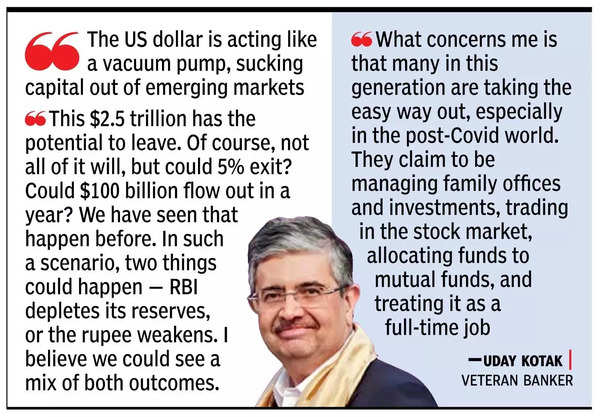
MUMBAI: Veteran banker Uday Kotak has warned that India’s economic ‘animal spirits’ are fading as the next generation of business families focuses more on managing investments than building and running companies.
Kotak also called for a cohesive strategy from policymakers to counter the “vacuum cleaner” effect of US policies, which are pulling foreign capital away, straining the current account, and affecting the exchange rate and liquidity.
Speaking at the group’s flagship investor event, Chasing Growth 2025, he said, “What concerns me is that many in this generation are taking the easy way out, especially in the post-Covid world. They claim to be managing family offices and investments, trading in the stock market, allocating funds to mutual funds, and treating it as a full-time job.”

He added, “If someone has sold a business, they should be thinking about starting, buying, or building another business. Instead, I see many young people saying, ‘I’m running my family office.’ They should be creating real-world businesses. Why not start from scratch?,” he said.
While acknowledging the importance of startup funding, Kotak questioned why individuals at 35 or 40 were not contributing directly. “I would love to see this generation be hungry for success and build operational businesses. Even today, I firmly believe that the next generation must work hard and create businesses rather than becoming financial investors too early in life.”
Kotak also highlighted the risks of relatively high stock valuations in India. “Should we continue encouraging retail investors to keep buying? Retail investors in India are funnelling money into equities daily, contributing to domestic institutional flows. Money from individuals from Lucknow to Coimbatore is flowing to Boston and Tokyo,” he said, noting that foreign companies were taking advantage of high valuations to book profits and repatriate funds.
“The US dollar is acting like a vacuum pump, sucking capital out of emerging markets,” Kotak said, pointing to the impact of a strengthening dollar and rising US Treasury yields above 4.5%, which are drawing capital from global markets. Indian stock valuations remain significantly higher than those in most other global markets.
India’s external account has three key components: foreign portfolio investment (FPI) at $800 billion, foreign direct investment (FDI), including both listed and unlisted capital, at close to $1 trillion, and $700 billion in external commercial borrowings. This brings the total repatriable capital stock to $2.5 trillion, while forex reserves – net of RBI’s forward short positions – stand at $560 billion.
India has seen exits from both FPIs and FDI. Companies like Whirlpool and Hyundai are reducing their holdings in Indian arms due to high valuations. In the financial sector, Prudential is looking to sell its stake in Prudential ICICI AMC through an offer for sale.
“This $2.5 trillion has the potential to leave. Of course, not all of it will, but could 5% exit? Could $100 billion flow out in a year? We have seen that happen before. In such a scenario, two things could happen – RBI depletes its reserves, or the rupee weakens. I believe we could see a mix of both outcomes.”
Kotak stressed the need for a strategic response. “The decision lies between tightening domestic liquidity or allowing the rupee to depreciate. What should our national strategy be? How should we approach this challenge? Our policymakers – including the finance ministry, RBI, and Sebi – must develop a cohesive strategy to counter this ‘vacuum cleaner’ effect.”





































